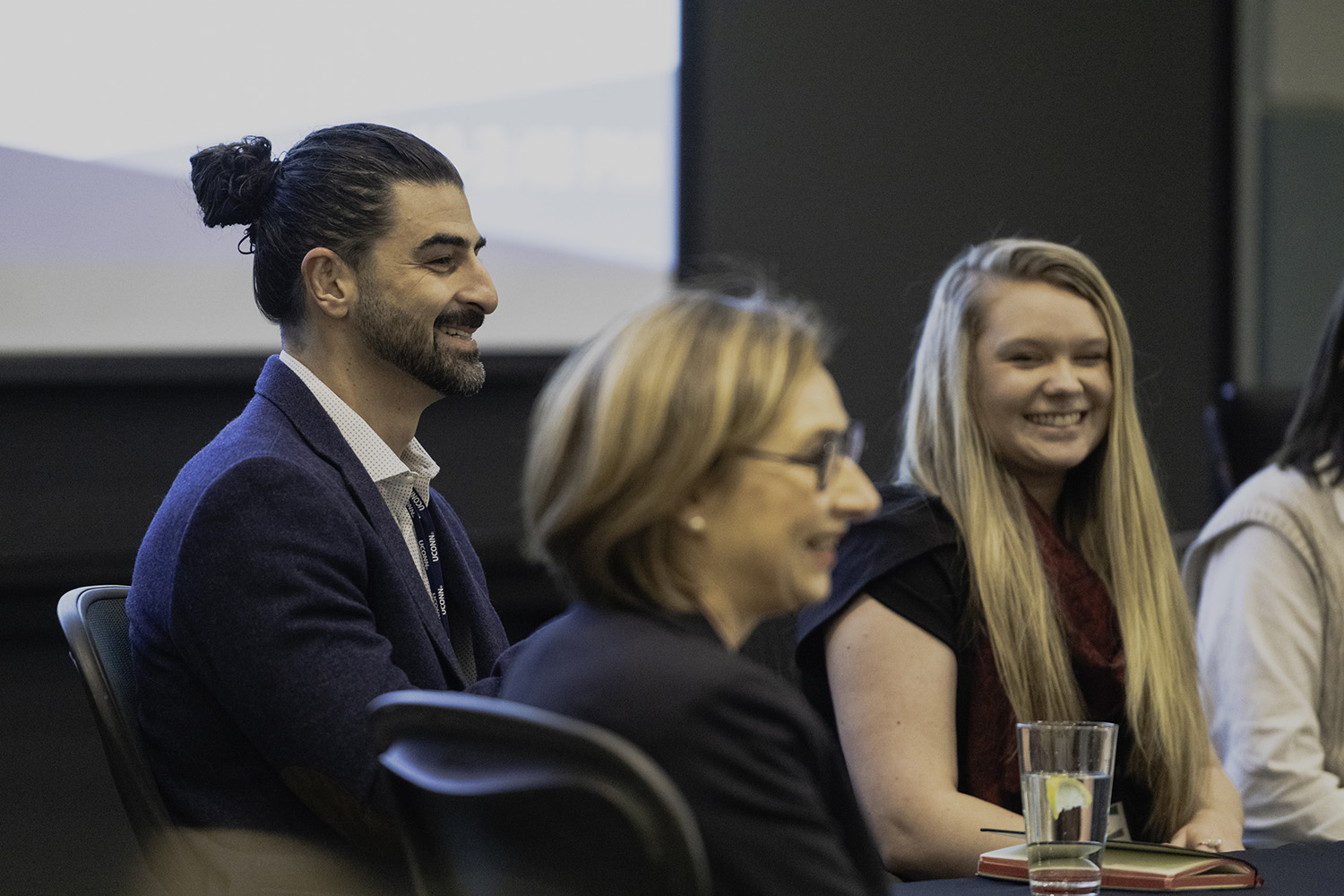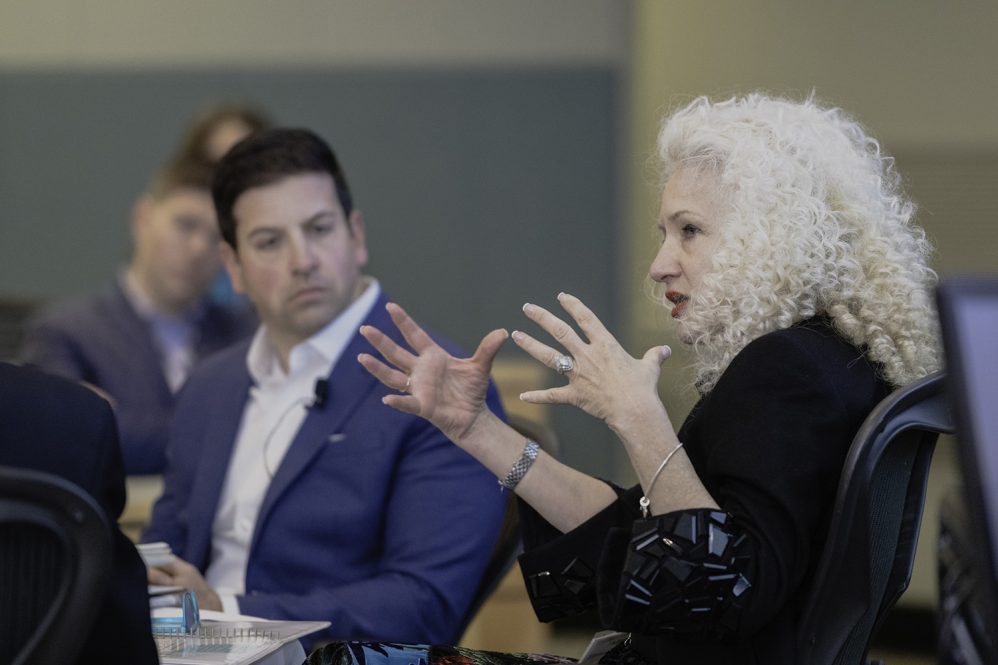When a team of technicians travels by boat from New London, Conn. to South Fork Wind, the Orsted-company’s expansive offshore wind farm, their vessel travels at a very slow speed to prevent disruption to whales and other marine life.
And while that is the best thing to do for the environment, the slow-moving boat gets rocked hard by the waves, making many members of the crew seasick before they get to the job site.
In addition, because of the speed limits, it takes up to 3.5 hours to get to the destination, a longer time than the technicians spend doing their work. It is just one of many stories shared at the annual Global Business Leadership in Sustainability Summit in Storrs on Friday, illustrating the challenges of implementing new technology and the complexity of creating a greener Earth.
The half-day Summit, sponsored by the School of Business, featured a series of presentations about ways in which Connecticut is shaping the future of clean energy and sustainability. It drew students, faculty, alumni and industry professionals with a shared interest in addressing some of the world’s biggest challenges.
Arminda Kamphausen, Director of Global & Sustainability Initiatives at the School of Business and the event organizer, said the summit fostered new knowledge and a host of new connections for its participants.
“It’s not easy to make changes, but it was inspiring to see the bright minds at a professional- and student-level all pulling together to make progress,’’ she said. “One of the presenters on the Clean Energy panel said she’d be happy to attend the event every year to interact with our students because she was so impressed by their knowledge, determination, and aspirations.’’
Big Vision, Bold Initiatives
The event started with a fireside chat between UConn President Radenka Maric and alumnus Brian Paganini ’03, Vice President and Managing Director of Quantum Biopower, a food-waste-to-energy plant in Southington. Moderated by School of Business Dean John A. Elliott, he first asked Maric about her pledge to make UConn carbon neutral by 2030.
“If you don’t have a big vision and you’re not bold, you’re not going to get anywhere,’’ Maric said. By the 1990s, researchers understood what was happening with climate change and the magnitude of the problem the world was facing, she said. “We have to stay focused because we don’t have another planet!’’ said Maric who is a research expert on fuel cells and batteries, and hydrogen generation
“Temperature change, sea level change, methane in the ocean, are all factors that are not visual to most of us. But the extreme fires and flooding are evidence to all of us of the human-induced pain to our planet,’’ she said. “As a leader, if I can do one thing it is to build awareness and take actions because no one can this alone.’’
UConn has been named the second most sustainable university in the U.S. by GreenMetric in December 2023. The new dormitory being constructed on South Campus will be off the grid, Maric said, thanks to geothermal technology, fuel cells and solar panels.
Paganini also detailed the lengthy process to build Quantum Biopower, which receives 40,000 tons of food waste a year, which is repurposed as energy and compost.
His research required months inspecting and analyzing design technology abroad, followed by 2.5 years to the permits for the facility before shovels could go in the ground. He and his team worked with the state legislature to get a law passed so that restaurants and grocery stores would be required to divert their food waste from landfills. It took more effort to get permission, as a non-utility company, to sell power back to the town of Southington, which uses it to power municipal buildings.
Both Maric and Paganini spoke of how important infrastructure and policy are for advancement.
“It is important to educate the public because without it’s acceptance, you will fail,’’ she said. “Not only is tech readiness vital, but the political landscape is also very important.’’
Paganini agreed, saying the biggest challenge he encounters is the lack of a consistent national policy about recycling and green energy.
Clean Energy, Offshore Wind Advances

The Summit also featured a panel on clean energy moderated by OPIM professor Jennifer Eigo. Speakers included alumnus Bryan Dougherty ’17 MBA, Operations Preparation Project Manager at Orsted; Dan Boyd, ’12 MBA, founder of Current Trucking; Larry Seiler, Head of Development at Ozone Renewables; and Lauren Burm, Senior Director at Vestas.
Seiler said many people take the U.S. energy grid for granted, but it is very archaic in some ways and evolving at breakneck speed in others.
“It is ripe for innovation from solar panels and energy storage,’’ he said. “So many great people are doing great things to innovate.’’
But he and the other panelists also spoke of the complexity of every project, from ideas to permits to financing, equipment maintenance and community response.
“Where do you put a large wind field? People love renewable energy til it comes to their neighborhood,’’ he said.
Burm displayed a slide show photos of the enormous blades and turbines used in the South Fork project, that will eventually power 70,000 Long Island homes, and discussed the challenge of transporting and assembling them.
Dougherty said that the wind farm is soon to be commissioned after a “tightrope walk’’ of approvals. Now Orsted must focus on maintenance. With seawater and erosion, maintenance is critical and requires heli-hoisting technicians to the top of the turbine or transferring the crew by vessel. Both options are expensive, he said. Every state has different regulations, so while 75 percent of the application and implementation process can be re-deployed, there is always 25 percent that’s brand new, he added.
Boyd said there is an employee shortage in the clean-energy industry. “There is a shortage of talent because there’s so much competition,’’ he said to the students in the audience. “Tell your friends why sustainability is important to you and future generations.’’
Advice for a Better Tomorrow
During a panel on ESG, the three speakers were asked what consumers can do to make the world more habitable.
Heather Burns, CEO of the Connecticut Sustainable Business Council, urged those in the audience to buy fewer things. John Mandyck, CEO of Urban Green Council of New York City and an adjunct faculty member, said consumers should waste less food. And Karen Jarmoc, Senior Sustainability Consultant at the National ESG Council, said her hope would be to engage the younger generation in thinking about sustainability in hopes of building new leaders for tomorrow.
The event also featured panels of young alumni and current students, who enthusiastically shared their experiences in their early quest for change.
Sophomore Aminieli Hopson is majoring in real estate and urban economic studies, serves as the President of the Business Connections Living Learning Community, and is the first business student to intern at the UConn Office of Sustainability. He described how living in Tanzania, as well as four states in the U.S., made him realize that sustainable change must be addressed differently depending on the region’s culture.
After the event, he said he thought the presentations were phenomenal, and that he was excited to expand his knowledge and to add some key people to his professional network.



